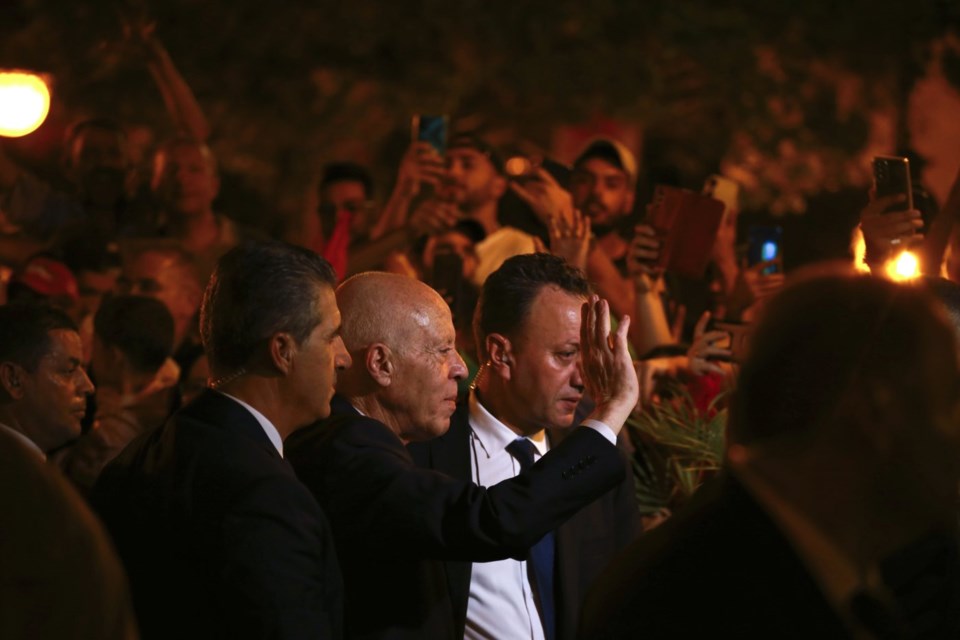TUNIS, Tunisia (AP) — Tunisia’s President Kais Saied won re-election in landslide victory after a campaign season saw his opponents jailed alongside journalists, activists and attorneys.
The North African country’s Independent High Authority for Elections said on Monday evening that Saied had won 90.7% of the vote — a reflection of how his supporters participated in Sunday’s race while the majority of his detractors chose to boycott.
His closest challenger, businessman Ayachi Zammel, won 7.4% of the vote after sitting in prison for the majority of campaign season facing multiple prison sentences for election-related crimes.
The election was Tunisia’s third since the 2011 Arab Spring, when protests for “bread, freedom and dignity” led to the ouster of President .
THIS IS A BREAKING NEWS UPDATE. AP’s earlier story follows below.
TUNIS, Tunisia (AP) — Tunisia’s incumbent president said he would wait for official results before declaring victory while acknowledging exit polls showing him winning by a landslide in an election Sunday marred by .
President Kais Saied's supporters jubilantly honked and celebrated after voting ended and public television broadcast images of to pursue traitors and those acting against Tunisia, much like he has throughout his tenure.
“We’re going to cleanse the country of all the corrupt and schemers," Saied said at his campaign headquarters.
Tunisia's public television broadcast exit polls from Sigma Conseil, an independent firm that has historically published figures not far off official tallies, showing Saied winning more than 89% of the vote over imprisoned businessman Ayachi Zammel and Zouhair Maghzaoui, a leftist who supported Saied before choosing to run against him.
In the North African country known as the birthplace of the Arab Spring, much of the opposition chose to boycott the election. They called it a sham with Saied's leading critics imprisoned alongside journalists, lawyers, activists and leading civil society figures. They emphasized the low turnout in Sunday's election. Official results are expected on Monday.
At the time polling stations closed, only 2.7 million voters, 27.7% of the electorate, had cast ballots — far fewer than the 49% who participated in the first round of the last presidential race in 2019.
Supporters of the president — who rode anti-establishment backlash to win a first term five years ago — said his second win would send a clear message to the political class that preceded his ascendance.
“We're tired of the governance we had before. We want a leader who wants to work for Tunisia. This country was on the road to ruin,” said Layla Baccouchi, a Saied supporter.
The election was third since Tunisia became the first country to overthrow a longtime dictator in the Arab Spring uprising in 2011. Weeks after a fruit vendor set himself ablaze to protest police humiliation and corruption, President was ousted and fled the country.
In the years that followed, Tunisia enshrined a new , created a Truth and Dignity Commission to bring justice to citizens tortured under the former regime and saw its leading civil society groups for brokering political compromise. But its new leaders were unable to buoy its and quickly became unpopular amid constant political infighting and
Observers judged the country's first two post-Arab Spring elections as free and fair. However the lead-up to this year's race saw the arrests of several declared challengers and the ongoing incarceration of his most prominent right-wing and Islamist critics.
Dozens of candidates had expressed interest in challenging the president and 17 submitted preliminary paperwork to run in Sunday’s race. However, members of the election commission, all of whom are appointed by the president, approved only the three. Zammel was subsequently charged with violating election laws and sentenced to years behind bars.
The president's detractors have routinely staged protests since July 2021, when he used emergency powers to suspend parliament and later rewrote the constitution giving himself more power. Since then, dozens of his opponents have been imprisoned on charges including inciting disorder, undermining state security and violating a controversial anti-fake news law that critics say is used to stifle dissent.
Among the changes enshrined in Saied's constitution, which voters approved via referendum the following year, was allowing the president to appoint all members of Tunisia's election authority, ISIE. It has faced scrutiny this year for ignoring court rulings ordering it put candidates it rejected back on the ballot and denying election monitors permission to observe the polls.
Such conditions led many to boycott the race, including Siwar Gmati, a 27-year-old who works for I Watch, one of the non-governmental organizations whose application to monitor the polls was rejected.
“We, as young people, are more attached to what the revolution brought to us,” Gmati said at a Friday protest. “We were raised after the revolution to speak our minds.”
Apart from Friday's protest and Sunday's celebration in downtown Tunis, there were few signs that an election was even underway throughout campaign season. The mood was a pronounced departure from the country's past two presidential elections, which were Tunisia's first contested races in decades.
Critics have called years of crackdown on Saied's opponents democratic backsliding and a reversal the progress made after the Arab Spring. Additionally, the country’s continues to face . Unemployment has steadily increased to one of the region’s highest at 16%, the government owes billions to international lenders and an increasing number of Tunisians attempted to migrate to Europe without authorization each year from 2019 to 2023.
__
Associated Press writers Sam Metz and Mehdi El Arem contributed to this report.
Bouazza Ben Bouazza And Annie Risemberg, The Associated Press



